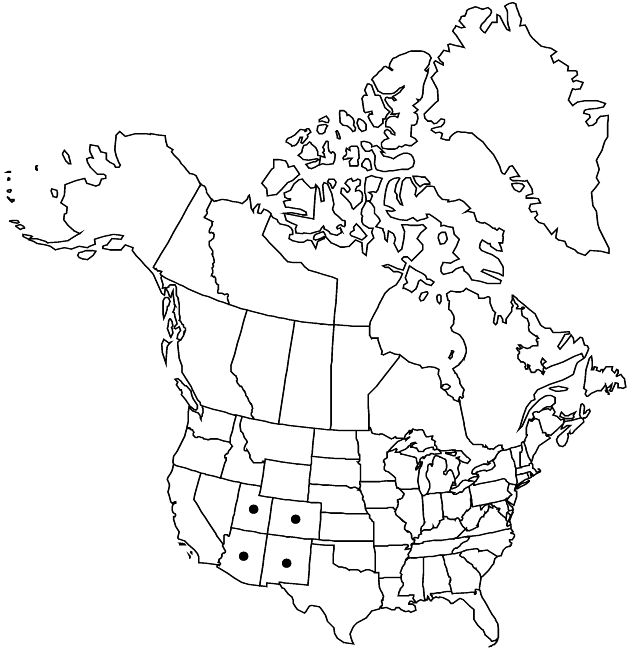Difference between revisions of "Heterotheca villosa var. pedunculata"
Brittonia 39: 383. 1987.
FNA>Volume Importer |
imported>Volume Importer |
||
| (5 intermediate revisions by 2 users not shown) | |||
| Line 7: | Line 7: | ||
|year=1987 | |year=1987 | ||
}} | }} | ||
| − | |basionyms={{Treatment/ID/ | + | |special_status={{Treatment/ID/Special_status |
| + | |code=E | ||
| + | |label=Endemic | ||
| + | }} | ||
| + | |basionyms={{Treatment/ID/Basionym | ||
|name=Chrysopsis pedunculata | |name=Chrysopsis pedunculata | ||
|authority=Greene | |authority=Greene | ||
| + | |rank=species | ||
| + | |publication_title=Pittonia | ||
| + | |publication_place=4: 154. 1900 | ||
}} | }} | ||
|synonyms= | |synonyms= | ||
| Line 35: | Line 42: | ||
-->{{#Taxon: | -->{{#Taxon: | ||
name=Heterotheca villosa var. pedunculata | name=Heterotheca villosa var. pedunculata | ||
| − | |||
|authority=(Greene) V. L. Harms ex Semple | |authority=(Greene) V. L. Harms ex Semple | ||
|rank=variety | |rank=variety | ||
| Line 49: | Line 55: | ||
|publication title=Brittonia | |publication title=Brittonia | ||
|publication year=1987 | |publication year=1987 | ||
| − | |special status= | + | |special status=Endemic |
| − | |source xml=https:// | + | |source xml=https://bitbucket.org/aafc-mbb/fna-data-curation/src/2e0870ddd59836b60bcf96646a41e87ea5a5943a/coarse_grained_fna_xml/V19-20-21/V20_549.xml |
|tribe=Asteraceae tribe Astereae | |tribe=Asteraceae tribe Astereae | ||
|genus=Heterotheca | |genus=Heterotheca | ||
Latest revision as of 20:04, 5 November 2020
Stems erect, (12–)30–50(–75) cm, moderately to densely strigose, usually sparsely, rarely abundantly long-hirsute eglandular or sparsely stipitate-glandular. Distal cauline leaf blades oblanceolate, (4–)14–31 × (1.5)–3.7–8 mm, sometimes little reduced distally, margins flat, faces (pale green to white) densely strigose (hairs (42–270)/mm2), eglandular or sparsely stipitate-glandular (glands 20–49/mm2). Heads 1–18(–39), in congested to open, usually corymbiform, sometimes subumbelliform arrays. Peduncles (7–)12–40(–58) mm, moderately to densely hispido-strigose, eglandular or sparsely stipitate-glandular; bracts few, linear-oblong, reduced distally, bracts subtending heads phyllary-like or none. Involucres cylindric to narrowly campanulate (fresh), (4.6–)6.6–11 mm. Phyllaries lanceolate to narrowly triangular-lanceolate, margins often reddish purple distally, faces densely strigose, eglandular to sparsely glandular. Ray florets 9–17(–26), laminae (5.5–)6.6–10.5(–12) mm. 2n = 18, 36.
Phenology: Flowering (May–)Jun–Oct(–Nov in s).
Habitat: Sandy soils, ponderosa and fir-spruce forests, Upper Sonoran Zone (pinyon-juniper), mixed grasslands, disturbed areas, rocky outcrops, pastures, riparian habitats
Elevation: 1200–2900 m
Distribution

Ariz., Colo., N.Mex., Utah.
Discussion
Variety pedunculata usually has pale green to white, densely strigose, sparsely to moderately stipitate-glandular, oblanceolate leaves, and often long-pedunculate heads that are not subtended by large bracts. It hybridizes with var. minor throughout its range, and is similar to but more densely hairy than the more northern and eastern var. villosa.
Selected References
None.